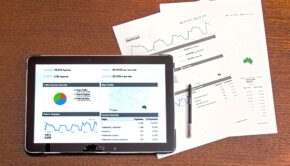4 Industries Data Is Transforming Overnight
Regardless of their size, all businesses make their decisions using one important component: data. Although it comes in many forms, data collection and what it tells us drives the growth and sustainability of various industries and has completely reshaped how products and services are created.
Most of us understand the concept of data and how it can be beneficial, but many don’t really understand how companies collect and apply it in practical business applications. Below we will discuss four industries that have been significantly impacted by technological advances in data collection and how they use this information to provide better services for customers and clients.

Image Source: Pixabay
The Healthcare Industry
When you think of an industry that is dependent on a stream of accurate data, it’s hard not to think of the healthcare system. Hospitals care for millions of patients each year, all with unique medical records and family history. But more effective solutions for the collection and management of digital data records has created many new advancements in healthcare.
Today, patient records are analyzed with powerful software that can quickly detect early signs of high-risk medical profiles. Using predictive analysis, computers can recognize patient patterns over time and help to diagnose chronic health issues much quicker than human doctors, recommending appropriate treatment plans as early as possible.
Another benefit of data usage and analytics in healthcare is the ability for hospitals to better staff and budget their different departments. Healthcare practices and hospitals often see a high amount of waste throughout the year because of inaccurately forecasted needs. By using unified information systems, hospitals can recognize spikes and trends in patient data that will help them make better-informed decisions on staffing needs and reduce bed shortages for patients.
Human Resources
Data compiling technology has also led to many advancements for job recruiters and human resources companies. Due to the sheer volume of data being collected from potential job candidates and employers, HR companies are now using analytics to help them improve their efficiency and find better job matches for their clients.
Recruiters now rely on important metrics to drive their decisions when finding new sources to access clients and how they measure the likelihood of a candidate’s success after they’re hired. Metrics like application conversion rate, time to hire, and candidate engagement levels help employers to fine-tune their hiring process for better results. These metrics help companies to attract the right people to their organization and give new hires the best chance for future success.
Supply Chain Management
Big Data has made significant changes in how modern businesses manage their supply chain. It not only plays a vital role in how manufacturers coordinate the production of their products and how they bring them to market, but it also helps to build and expand operations for organizations big and small.
When it comes to business operations, data points dictate how technology tracks and analyzes multiple activities in an organization. These activities include inventory management, demand forecasting, order tracking, and data compliance reporting. Investments in advanced ERP (Enterprise Resource Planning) solutions have made it possible for companies to track and analyze these large data points while automating many of the processes to manage them effectively.
Another important aspect of a business’s sustainability is its ability to effectively track and optimize operational costs. Resource expenditures can be extremely dynamic in certain industries, and if companies aren’t careful, profit margins can quickly diminish. Being able to recognize dangerous trends in spending as soon as they start is vital for business survival. By using predictive analytics software, companies can forecast their spending at different stages of growth to recognize potential roadblocks in cash flow before they arise.
E-Commerce Platforms
With the advancement of predictive analytics and AI-driven search recognition, organizations who operate through e-commerce platforms have found it much easier to understand the shopping patterns of their customers and better care for their needs. By using data figures to recognize different customer personas, geographic locations, and pricing preferences, companies can create better user experiences on their sites and see better sales conversions.
Customer journey mapping has become a vital process for any company selling its products or services online. By using data metrics to better understand the customer’s sales cycle, companies can find and repair digital roadblocks in the sales cycle, creating a more enjoyable purchasing experience.
Another area of business that thrives off of data analytics is customer service. The success of any e-commerce business is almost solely dependent on the business’s ability to provide an effective and consistent customer service experience. Thankfully, big data analytics have made it possible to quickly analyze minor or major issues that develop during transactions and gives organizations the information they need to address issues promptly with customers.
Data collection will always play an important role in our society. As technology continues to advance, we can only expect that the products and services we receive will continue to improve as the availability and accuracy of information drive better automation, more advanced security, and improved efficiency.
















